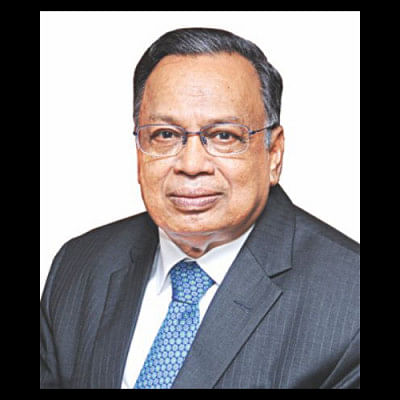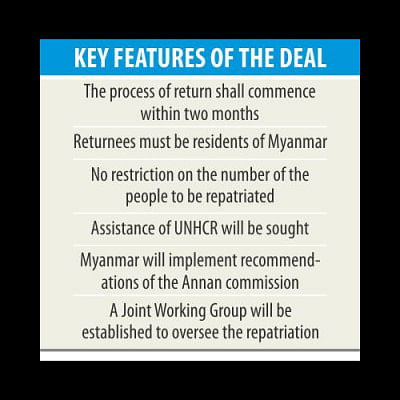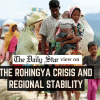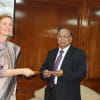Country's interest protected

Foreign Minister AH Mahmood Ali yesterday said Dhaka protected its interest in signing the deal with Naypyitaw over the repatriation of Myanmar nationals and hoped to send them back home within “a reasonable time”.
“Our interest has not been ignored or hampered at all…our main goal is to send back the Rohingya Muslims sheltered in Bangladesh and we have been able to make Myanmar agree to take back its nationals,” he said at a press conference at the foreign ministry after returning home from Myanmar.
The ministry distributed copies of the “Arrangement on Return of Displaced Persons from Rakhine State”, signed between the two countries in Naypyitaw on Thursday, among journalists.
Responding to questions from reporters, Mahmood said the criticism about not mentioning a specific timeframe in the agreement for completion of the repatriation was not right, because it can't be done within a given timeframe. “Both the countries have agreed to start the repatriation process in two months and it will be completed within a reasonable time.”
Asked whether “a reasonable time” is a vague term, the minister said it's obviously a vague term. “There is no benefit in mentioning a specific timeframe as well.”
He, however, admitted that the deal was signed following the general guiding principles of the 1992 agreement. “Myanmar wanted to sign the repatriation arrangement based on the 1992 deal and it was done accordingly.”
Earlier on October 9, the minister at a diplomatic briefing in the capital said Dhaka did not agree with the Naypyitaw's proposal for following the principle and criteria of the 1992 deal to take back the Myanmar nationals. The 1992 criteria is “not realistic” and the current situation was “entirely different” from that of 1992, he added.
Around half of the Muslim villages in Myanmar's Rakhine State have been burned down since August 25. “So, the identification of Rohingyas based on their residence in Rakhine will not be realistic. Bangladesh, therefore, proposed and handed over a new arrangement to the visiting [Myanmar] minister outlining the principles and criteria for repatriation,” he told foreign diplomats.
Under a joint statement signed on April 28, 1992, Myanmar had agreed to take back only those Rohingyas who could “establish their bona fide residency in Myanmar” prior to their departure for Bangladesh.
Following the latest bilateral discussion held in Naypyitaw on Wednesday, the two countries reached an understanding on considering all relevant documents, facts and requirements for sustainable return of the displaced Myanmar nationals.
“For verification, Myanmar will provide the necessary forms to be filled by the prospective returnees. Forms used in the post-1992 repatriation would generally be used as reference,” the latest deal reads.
Mahmood said Bangladesh and Myanmar have agreed to duly associate the UNHCR with the repatriation process and take assistance from it.
Under the agreement, Myanmar will take back those people, who entered Bangladesh after October 9 last year and August 25 this year, he added.
Repatriation of those who took shelter in Bangladesh before October 9 last year would also be considered separately after conclusion of the present arrangement, the minister told journalists.
“The signing of the arrangement is an initial step…. There are more steps. Both sides have agreed to take assistance from the UNHCR in the Rohingya repatriation process. Myanmar will take assistance as per its requirement.”

He said the Myanmar government agreed to take assistance from China and India over setting up prefabricated houses for the returnees. The makeshift houses will be essential as they will initially be kept at temporary shelter houses before being rehabilitated to their place of origin or nearby places as per their choice.
“Most of the houses have been torched…. Where will they stay after returning there?…I talked with India and China before and after my visit to Myanmar, and requested the two governments to supply prefabricated houses for the returnees. Both the countries agreed to extend their cooperation in this regard,” said the foreign minister.
Mahmood said when he informed the Myanmar authorities about his talks with India and China on makeshift houses, Myanmar Union Minister Kyaw Tint Swe said his country would talk with the two countries in this regard.
According to the foreign minister, Bangladesh and Myanmar agreed that a Joint Working Group will be set up within three weeks of the signing of the arrangement to oversee the repatriation. The terms of reference of the working group will be agreed upon by both the sides.
A specific instrument on the physical arrangement for the repatriation process would be drawn up upon reaching an agreement in a speedy manner. Both the countries may agree on further instrument(s), as needed, for successful completion of repatriation, the minister added.
As per the instrument, Myanmar has agreed to take necessary measures to halt the outflow of its residents to Bangladesh, to restore normalcy in Northern Rakhine and to encourage those who had left Myanmar to return voluntarily and safely to their own households and original places of residence or to a safe and secure place nearest to it of their choice.
The deal says Bangladesh will provide whatever data it can obtain on the displaced people who left Myanmar after October 9, 2016, and August 25, 2017, attacks. Subsequently, the two sides will quickly engage to find out details of their residentship in Myanmar, prior to their taking shelter in Bangladesh.
Based on the list of returnees or information provided by Bangladesh, the Myanmar government will accept all people along with their family members after verification, reads the agreement.
After completion of return, the two governments shall cooperate for the prevention of the illegal crossing of the borders by persons from either side. Both the governments shall refrain from granting residentship or citizenship to such illegal migrants, it added.
The foreign minister said during his tour to Myanmar, the two countries also signed a protocol, finalised in 2007, on redrawing the permanent boundary of the Naf river and exchanged an “instrument of ratification” on the agreement, signed in 1998, on the demarcation of land to the north of the Naf river.

 For all latest news, follow The Daily Star's Google News channel.
For all latest news, follow The Daily Star's Google News channel. 








Comments